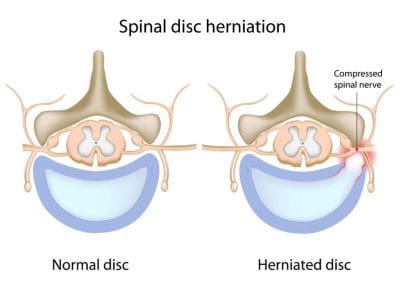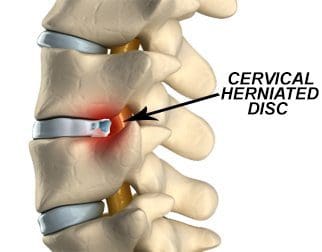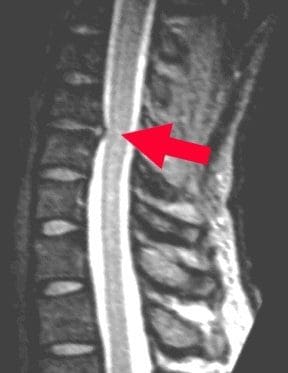If given the opportunity, a herniated disc can occur as a consequence of trauma and can create a plethora of problematic symptoms which might become chronic pain conditions. Whiplash is most frequently associated with car collisions, but can actually happen from any injurious procedure that snaps the neck forward or back beyond its normal selection of movement.
This informative article will detail the prevalence of herniated discs related to whiplash events. We’ll investigate how whiplash occurs and how the process can enact disc injury in the cervical or upper thoracic spinal regions.
Whiplash Herniated Disc Incidents
Whiplash happens because of abrupt acceleration, or more commonly, sudden deceleration. Inertia is the force which can create harm to the spinal structures and the throat muscles at the neck and back.
The head is a really heavy weight that is supported by the slightly thinner and weaker vertebrae and intervertebral discs in the cervical spine. When inertia is applied to the entire body, the head will snap backwards or forward, causing both and typically hyperflexion or hyperextension. As it whips about causing an assortment of injurious events that are possible, including a herniated disc, this heavy weight places stress on the cervical spine.
Herniated Disc Pain and Discomfort
Whiplash typically occurs from severe trauma, such as an automobile accident, slip and fall, sports injury or act of violence. Any situation which causes the head to jolt abruptly back-and-forth, can cause whiplash.
Whiplash is a condition which sometimes occurs after an accident, but could also take some time to become apparent. The reasons for this time delay response vary, but are commonly linked to three possible causations:
First, it’s the pain relieving quality of adrenaline, which often fills the bodily systems during a crash. This can diminish the severity symptoms which might otherwise be debilitating when they occur. Second, is the psychological nocebo effect of the trauma, which could take some time to infiltrate and to come up within the subconscious mind. Finally, the secondary gain principle enacted by legal action having to do with the accident might causes time delay. It’s no coincidence that people begin to experience pain right around the time they seek professional help.
Whiplash & Herniated Disc Consequences
The vast majority of whiplash complaints are due to muscular injury, not damage to the spinal column. Neck muscle pain can be extremely severe, but is not a significant worry and should resolve with symptomatic treatment.



Extreme trauma or highly focused trauma can cause a bulging disc or even a ruptured disc in the neck or upper back. Symptoms are very likely to be painful for a number of weeks, but should resolve within 2 months, as is typical for practically any disc injury condition with the proper treatment and care.
Other less common effects of severe whiplash might incorporate a change in the natural curvature of the spine, a fractured or shattered vertebra or a torn ligament or tendon.
Whiplash Herniated Disc Guidance
A lot of men and women suffer whiplash traumas on a daily basis. These types of injuries are an inherent part of the fear we have towards spinal damage and are an integral component of litigation. Both of these factors make judging the actual degree of any whiplash neck injury complicated.
Pain is often worsened or perpetuated through psychosomatic or secondary gain factors, instead of structural anatomical problems. It is crucial, as a patient, to look past the psychological and legal implications of your injury and concentrate on your recovery.
The neck, like every other area of the human body, was made to heal, but will only do so in the event that you give it the mental and emotional support and trust it requires.
There isn’t anything more important than your health. Unfortunately, this is a lesson for those who endure a plethora of herniated disc treatments and eventual disc surgery simply to bolster a case that is legal. When the case is over, you might have some money, but is it really worth it to lose your freedom and functionality for the remainder of your life?

The scope of our information is limited to chiropractic and spinal injuries and conditions. To discuss options on the subject matter, please feel free to ask Dr. Jimenez or contact us at 915-850-0900 .
By Dr. Alex Jimenez
Additional Topics: Automobile Accident Injuries
Whiplash, among other automobile accident injuries, are frequently reported by victims of an auto collision, regardless of the severity and grade of the accident. The sheer force of an impact can cause damage or injury to the cervical spine, as well as to the rest of the spine. Whiplash is generally the result of an abrupt, back-and-forth jolt of the head and neck in any direction. Fortunately, a variety of treatments are available to treat automobile accident injuries.





